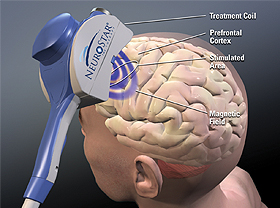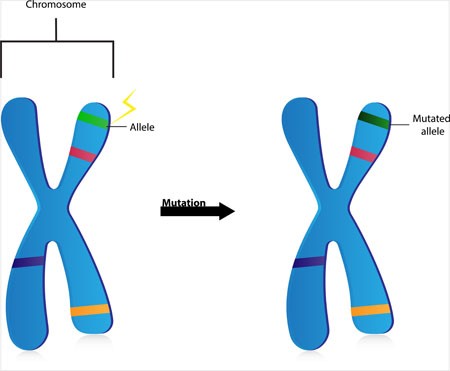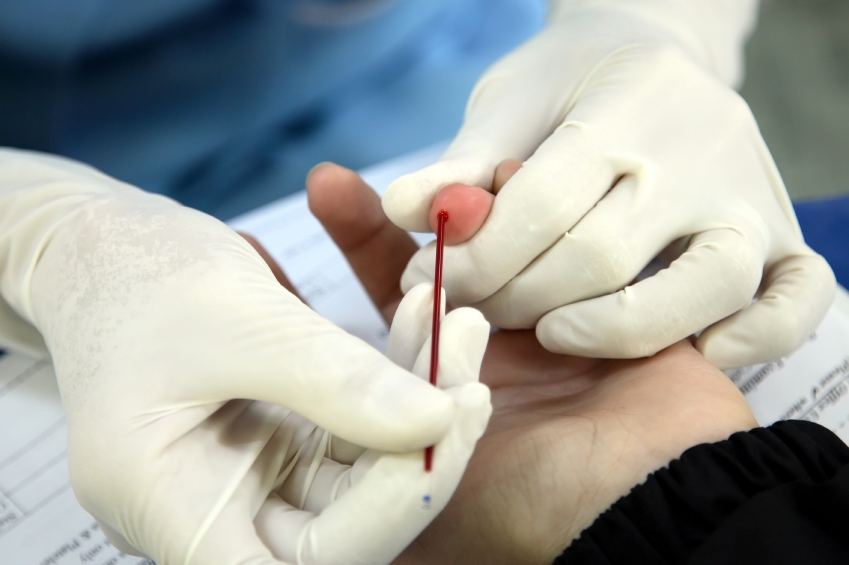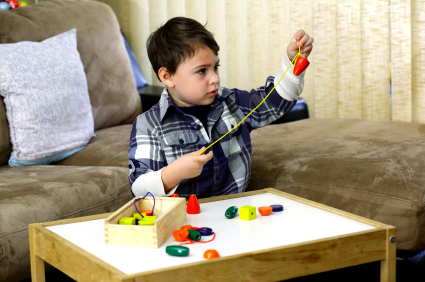RTMS Improves Executive Function in Kids with Schizophrenia and Autism
 Researcher Stephanie Ameis reported at the 2015 meeting of the American Academy of Child and Adolescent Psychiatry that following repeated transcranial magnetic stimulation (rTMS), a treatment in which a magnetic coil placed over the scalp delivers electric pulses to the brain, children with schizophrenia and autism spectrum disorders showed improvements in executive function, including working memory. The rTMS treatment targeted the left dorsolateral prefrontal cortex.
Researcher Stephanie Ameis reported at the 2015 meeting of the American Academy of Child and Adolescent Psychiatry that following repeated transcranial magnetic stimulation (rTMS), a treatment in which a magnetic coil placed over the scalp delivers electric pulses to the brain, children with schizophrenia and autism spectrum disorders showed improvements in executive function, including working memory. The rTMS treatment targeted the left dorsolateral prefrontal cortex.
“De Novo” Mutations in Dozens of Genes Cause Autism
Two studies that incorporated data from more than 50 labs worldwide have linked mutations in more than 100 different genes to autism. Scientists have a high level of statistical confidence that mutations in about 60 of those genes are responsible for autism. So-called de novo mutations (Latin for “afresh”) do not appear in the genes of parents without autism, but arise newly in the affected child. The mutations can alter whether the genes get “turned on” or transcribed (or not), leading to disturbances in the brain’s communication networks.
The studies led by Stephan Sanders and Matthew W. State appeared in the journal Nature in late 2014. The identified genes fall into three categories. Some affect the formation and function of synapses, where messages between neurons are relayed. Others affect transcription, the process by which genes instruct cells to produce proteins. Genes in the third category affect chromatin, a sort of packaging for DNA in cells.
Before the new studies, only 11 genes had been linked to autism, and the researchers involved expect to find that hundreds more are related to the illness.
Editor’s Note: This new research explains how autism could be increasing in the general population even as most adults with autism do not have children. It should also put to rest the idea, now totally discredited, that ingredients in childhood immunizations cause autism. It is clearer than ever that kids who will be diagnosed with autism are born with these mutations.
With these genetic findings, the search for new medications to treat this devastating illness should accelerate even faster.
Bottom line: Childhood immunizations don’t cause autism, newly arising mutations in the DNA of parents’ eggs or sperm do. However, parental behavior could put their children and others at risk for the measles and other serious diseases if they do not allow immunizations. The original data linking autism to immunization were fraudulent, and these new data on the genetic origins of autism provides the best hope for future treatments or prevention.
More Evidence N-Acetylcysteine Added to Risperidone Improves Irritability in Autism
We reported in 2014 that researchers Ahmad Ghanizadeh and Ebrahim Moghimi-Sarani had found that the over-the-counter nutritional supplement n-acetylcysteine (NAC) added to the atypical antipsychotic risperidone reduced irritability in autism more than placebo added to risperidone.
A randomized, double-blind, placebo-controlled clinical trial published by M. Nikoo and colleagues in Clinical Neuropharmacology in 2015 replicated these results. Forty children with autism disorders aged 4–12 years were randomized to receive either risperidone plus NAC or risperidone plus placebo. Risperidone doses were between 1 and 2 mg/day, and NAC doses were 600 to 900 mg/day. By the end of the 10-week study, those children who received NAC had significantly greater reductions in irritability and hyperactivity/noncompliance than those who received placebo.
Editor’s Note: Three placebo-controlled studies have supported the efficacy of NAC in autism. One 2012 study, by A.Y. Hardan in Biological Psychiatry, evaluated monotherapy with oral NAC. In the other two, NAC was added to treatment with risperidone.
No Evidence Chelation Therapy Can Treat Autism
Some children with autism have been subjected to chelation therapy, which is used to remove heavy metals from the blood after poisoning. The rationale for using this therapy in autism was the discredited theory that autism resulted from mercury poisoning. A recent review of research on chelation therapy for autism by the Cochrane Collaboration, a nonprofit health research organization, found only one randomized controlled trial of chelation therapy, which had a flawed methodology and also found no evidence of a reduction in autism symptoms. This means there is no evidence that chelation therapy, which can lead to kidney failure or death, has any effect on autism symptoms. Based on the lack of evidence that the therapy has benefits for children with autism spectrum disorders, its great expense, and the dangers it poses, chelation therapy should not be prescribed as a treatment for autism.
Effect Size of Autism Treatments
At the 2014 meeting of the American Academy of Child and Adolescent Psychiatry, Fung et al. presented a meta-analysis of treatments for autism that ranked them in terms of statistical effect size, ranging from 0.9 (large), to 0.5 to 0.8 (medium), to <0.4 (small). The only drug with a large effect size was risperidone, at 0.9. Most effect sizes were medium, including aripiprazole at 0.8 and N-acetylcysteine (NAC) at 0.7. Both clonidine and methylphenidate had effect sizes of 0.6, and tianeptine’s was 0.5.
Fung and colleagues noted that the first two on the list, the atypical antipsychotics risperidone and aripiprazole, often have problematic side effects (such as sedation, weight gain, and motor symptoms) that must be balanced against their effectiveness. In contrast, NAC is well tolerated with few side effects, and two placebo controlled studies showed that it was effective both alone and as an adjunctive treatment to the antipsychotic risperidone.
In Mice, Autism-Like Behavior Connected to Problems Pruning Dendritic Spines
Autism spectrum disorders are associated with developmental abnormalities at excitatory synapses. Dendrites, the branched projections of neurons where electrical signals are passed from one cell to the next, are covered in hundreds to thousands of spines that facilitate the synaptic connections with other neurons. These spines are created and also pruned as part of normal learning and development.
Post-mortem examination of the brains of patients with autism spectrum disorders shows increased density of dendritic spines and less pruning in certain neurons in the temporal lobe. These examinations also show impaired mTOR autophagy. MTOR is a protein that plays a role in cell growth and survival. Autophagy is the normal process by which some components of cells are broken down.
A 2014 study by Guomei Tang et al. in the journal Neuron showed that mice that are genetically altered to have overactive mTOR also have reduced dendritic spine pruning, blockade of autophagy, and increased autism-like behaviors. An immunosuppressant drug called rapamycin inhibits mTOR, and treating the mice with this drug corrected the problems with spine pruning and the autism-like behaviors. (This was not true for mice who had been altered to have another type of autophagy.) Normal spine formation was not affected by the restored pruning ability.
Tang et al. concluded that mTOR autophagy plays an important role in dendritic spine pruning, and that restoring neuronal autophagy can correct synaptic abnormalities and restore normative social behavior in mice with hyperactive mTOR.
Combination of N-acetylcysteine and Risperidone Improves Irritability in Autistic Disorders More Than Placebo and Risperidone
In a 2013 study of 40 children and adolescents with autism spectrum disorders published by Ahmad Ghanizadeh and Ebrahim Moghimi-Sarani in the journal BMC Psychiatry, the combination of the over-the-counter nutritional supplement n-acetylcysteine (NAC) and the atypical antipsychotic risperidone alleviated irritability more than the combination of placebo and risperidone. Side effects were mild. The data extend 2012 observations by A.Y. Hardan et al. in which NAC improved irritability and stereotypy (repeated behavior) in autism more than placebo did.
The two studies taken together support the effectiveness of NAC prescribed either alone or in conjunction with an atypical antipsychotic for the treatment of autism.
Iron Deficiency Linked to Psychiatric Disorders in Children
Iron deficiency is the most prevalent nutritional deficiency in industrialized countries and can cause problems with cognitive and intellectual development. New research published in the journal BMC Psychiatry shows that it has psychiatric ramifications as well. Children and adolescents with iron deficiency anemia are at greater risk for psychiatric disorders, including depression, bipolar disorder, anxiety, and autism.
Iron supplementation should be implemented in children with iron deficiency anemia in order to prevent any possible psychiatric repercussions, and similarly, psychiatrists should check iron levels in young patients with psychiatric disorders.
Iron provides myelin for white matter in the brain and plays a role in the function of neurotransmitters.
NAC Improves Irritability and Repetitive Behaviors in Children with Autism
 The antioxidant N-acetylcysteine (NAC), which can be found in health food stores, seems to be effective for irritability and repetitive behaviors in children with autism. In a small controlled study that was published by Hardan et al. in the journal Biological Psychiatry in 2012, 33 mostly male children with autism (aged 3-12 years) received either placebo or NAC at doses of 900mg daily for 4 weeks, followed by 900mg twice daily for 4 weeks, then 900mg three times a day for 4 weeks. Beginning in week 4, the children receiving NAC showed significantly improved irritability scores, and a trend for improvement in repetitive behaviors.
The antioxidant N-acetylcysteine (NAC), which can be found in health food stores, seems to be effective for irritability and repetitive behaviors in children with autism. In a small controlled study that was published by Hardan et al. in the journal Biological Psychiatry in 2012, 33 mostly male children with autism (aged 3-12 years) received either placebo or NAC at doses of 900mg daily for 4 weeks, followed by 900mg twice daily for 4 weeks, then 900mg three times a day for 4 weeks. Beginning in week 4, the children receiving NAC showed significantly improved irritability scores, and a trend for improvement in repetitive behaviors.
Social responsiveness did not improve significantly, but the children receiving NAC did show some improvement in some areas of social behavior, such as social cognition and autism mannerisms.
There were few side effects associated with NAC. The most significant were gastrointestinal side effects, but these were mild, especially when compared with the side effects associated with FDA-approved treatments for autism, such as the atypical antipsychotics risperidone and aripiprazole.
The authors of the study plan to expand their research in a study of more than 100 children with autism.
Editor’s Note: It should we previously summarized this study in the BNN based on research presented by Fung et al. at a meeting of the American Academy of Child and Adolescent Psychiatry two years ago. The study has now been published.
Drug Used for Fluid Retention May Be Useful in Autism
Bumetanide has been used for decades to treat fluid retention in those with heart failure or liver or kidney disease. In the brain, it allows chloride ions to leave cells more easily. Scientists researching pediatric seizures think that reducing the chloride inside brain cells helps GABA neurons’ inhibitory functions work better. This led to speculation that bumetanide could be useful in neonatal epilepsy and autism.
In a 2012 study by French researchers including Eric Lemonnier that was published in the journal Translational Psychiatry, 60 patients aged 3 to 11 who had been diagnosed with autism or Asperger’s syndrome were given either placebo or 1mg of bumetanide daily for 3 months. By the end of the study, the children who received bumetanide showed an average reduction of 5.6 points on the Childhood Autism Rating Scale (CARS), which is assessed from observing behavior during videotaped sessions of children playing with their caregiver and questioning the child’s parents. Children taking placebo showed a reduction of 1.8 points (a statistically significant difference). Clinicians in the study rated almost twice as many children who took bumetanide as having made a significant or a small improvement. Stereotyped behavior and restricted interest were the areas of behavior that seemed to improve most after treatment with bumetanide. Patients with milder autism when the study began tended to improve more than those who started out with more severe symptoms. Symptoms returned to previous levels within a month the study’s end.
Bumetanide’s side effects are well known. It can sometimes cause decreases in potassium in the blood (hypokalemia), so the children’s potassium levels were monitored closely. One child was withdrawn from the study for hypokalemia, which can predispose one to cardiac arrhythmias.









